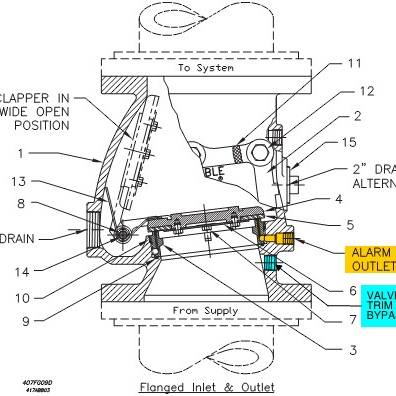The Importance of Proper Waterflow Switch Testing
April 13, 2017
If you are reading this blog, then you are likely more aware than most of the importance of sprinkler system inspection, testing, and maintenance (ITM). One of our recent projects involved our client, a tenant, moving into a…
Fire Prevention Tips for Wood Pellet Plants
News,Blog,System Design,Combustible Dust,Fire Safety Audits,Fire Safety Tips
January 16, 2014
My last blog discussed the dangers of wood pellet plant facilities and included an overview of several recent incidents. Today, I would like to review a few fire prevention tips for wood pellet plants. The process of…
What Lesson Can We Take From Massive Brazil Sugar Fire?
News,System Design,Hazard & Risk Assessment,Fire Safety Audits
December 26, 2013
In October, a massive fire ignited approximately 180,000 tons of sugar and tore through six warehouses at Copersucar, one of Brazil’s, and the world’s, largest sugar operations. The fire was said to have started in a conveyor…
Fire Hazards and Fire Code Pitfalls When Increasing Your Occupancy Load
News,Hazard & Risk Assessment,Fire Safety Audits,AHJ Negotiations,Code Analysis
August 15, 2013
As an architect, you want to design a building that meets the owner’s needs and allows you to be creative at the same time. The balancing act can be difficult when you are wedged between the extensive fire code requirements for…
Is Egress Analysis Impacted during Your Incremental Build Projects?
News,Life Safety Audits,Hazard & Risk Assessment,Fire Safety Audits,Code Analysis
July 11, 2013
Travel distance and means of egress have become increasingly popular concerns. As owners expand buildings, they often increase the distance to the nearest exit to the point of violating code requirements. We recently consulted…
Cost-Effective Fire Hazard Mitigation
News,System Design,Forensics,Fire Safety Audits,AHJ Negotiations
June 13, 2013
Fire protection engineering is normally understood by its technical appliances like sprinklers, fire alarms, and fire hazard warning signs. Although these tools are extremely effective at reducing risk and dealing with…
Fire Protection Engineering Standards for Welding and Hot Work Hazards
News,Fire Safety Audits,Development of Procedures,Associate Training
May 23, 2013
Hot appliances and open flames are a proven source of danger for maintenance and repair crews. Between 1990 and 2010, the U.S. Chemical Safety and Hazard Investigation Board (CSB) identified over 60 fatalities resulting from…
How Can Due Diligence Reduce your Fire Risk?
News,Blog,System Design,Fire Safety Audits,System Commissioning
September 26, 2012
What is Due Diligence? According to Wikipedia: "Due diligence" is a term used for a number of concepts involving either an investigation of a business or person prior to signing a contract, or an act with a certain standard of…
If Your Fire Protection System Malfunctions, Do You Know What To Do?
News,Life Safety Audits,Failure Analysis,Fire Safety Audits,Development of Procedures
August 23, 2012
Accidents happen. Murphy’s Law clearly states that, “Anything that can go wrong, will go wrong.” Engineers, like Fire Protection Engineers, focus on all of the potential ways something can go wrong and work to minimize the…
FM Global Relaxes Requirements for Very High Flashpoint “Ignitable” Liquids
News,Blog,System Design,Hazard & Risk Assessment,Fire Safety Audits
April 20, 2012
The newly published FM Global Data Sheet 7-29 on flammable and combustible liquids (now called “Ignitable liquids”) incorporates the very long awaited special consideration for high flashpoint liquids – those having a…
Property Loss Control Services Help Client Avoid $500K in Insurance Surcharges
News,Success Stories,Fire Safety Audits,PLC Audits,Property Loss Control Audits
January 25, 2011
How can property loss control services make a difference to your HPR insurance premium? The HPR property insurance underwriter for a confectionery manufacturer issued a warning that additional reinsurance of about $500,000…
Using Forensic Fire Engineering to Investigate Suppression Failures
News,Failure Analysis,Forensics,Success Stories,Fire Safety Audits
January 25, 2011
Forensic Fire Engineering Investigation of the Accidental Discharge and Catastrophic Failure of a Gaseous Fire Suppression System A large telecommunications company utilized high-pressure gaseous fire extinguishing systems to…
Property Loss Control Services Save Client Over $120,000
News,Hazard & Risk Assessment,Success Stories,Fire Safety Audits,Property Loss Control Audits
January 25, 2011
A carpet manufacturer in Glasgow, Virginia retained Harrington Group for property loss control services after receiving a report from their HPR insurance carrier that contained a mandatory recommendation to provide an…


